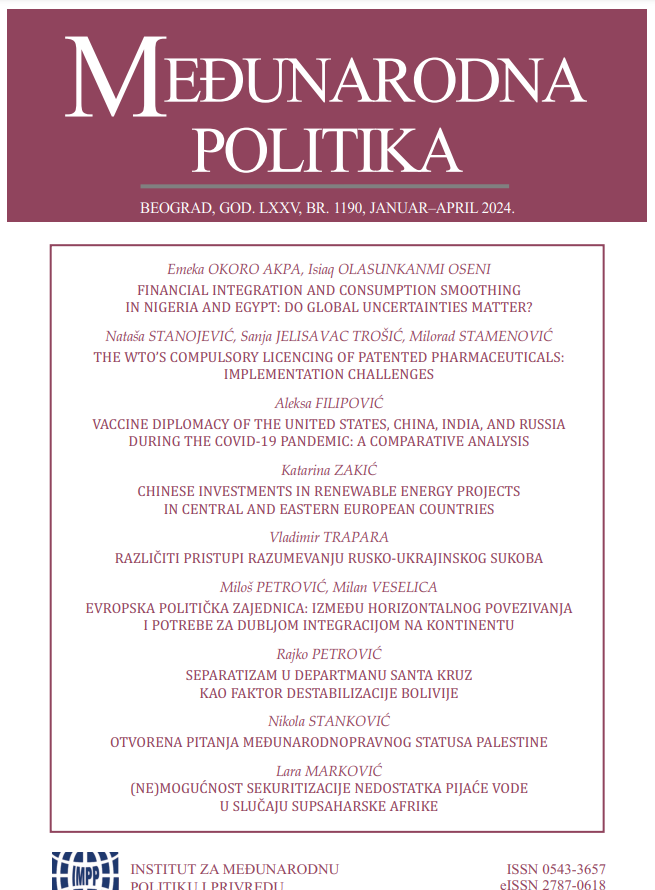International Politics
International Politics is a peer-reviewed, open-access scientific journal published by the Institute of International Politics and Economics, the leading scientific institution in the region dedicated to researching international relations. For more than 70 years, this interdisciplinary journal has published original analytical, theoretical, and review papers on a wide range of contemporary international political, economic, and legal relations.More details
Latest issue: International Politics Vol. 75 No. 1190/2024
Content
International Politics, 2024 75(1190):7-37
Abstract ▼
In this study, we adopt the structural vector auto-regressive (SVAR) model to assess the degree to which global uncertainties affect the relationship between financial integration and consumption smoothing in Egypt and Nigeria using quarterly data from 2010 to 2020. The study hypothesises that global uncertainty shocks will have adverse effects on consumption smoothing in both Nigeria and Egypt. Our main results from the study show that the economic policy uncertainty shock has a more declining effect on consumption smoothing in Egypt than other global uncertainty proxies. On the other hand, global economic condition shocks have a more declining effect on consumption smoothing in Nigeria than other global uncertainty proxies. In addition, financial integration accounted for more variability in consumption smoothing in Egypt than in Nigeria; this may be due to the fact that Egypt is more financially integrated than Nigeria. We therefore make the following recommendations: Nigeria may diversify the economy by promoting growth in other sectors, such as manufacturing, to reduce the impact of external shocks on the economy and provide greater stability for households. Policymakers in Egypt can diversify export markets and reduce reliance on the US market to mitigate the impact of US policy fluctuations on Egypt’s economy.
International Politics, 2024 75(1190):39-55
Abstract ▼
The focus of the research is the topic of compulsory licencing, the right under the Agreement on Trade-Related Aspects of Intellectual Property Rights for countries to use patented medicines without the patent holder’s consent as a form of relief (flexibilities) for developing countries. The research aims to assess whether the application of compulsory licencing has fulfilled its primary goals and purpose. The research problem is the inconsistency between the compulsory licencing application in practice and the original purpose. It is reflected in the mass use of this right by countries with higher incomes and, secondly, in the symbolic presence of contagious diseases. That was investigated using the Generalized Linear Model. The results confirmed that the actual situation of public health and the income level of beneficiaries had been marginalised as grounds for exercising compulsory licencing. The arbitrary application of compulsory licencing has led to the situation that the poorest countries, with the most significant health crises, remain in the background of this World Trade Organisation mechanism.
International Politics, 2024 75(1190):57-90
Abstract ▼
This research strives to present a comparative analysis of the vaccine diplomacy of the United States, China, India, and Russia during the COVID19 pandemic. As each of the examined countries possesses the technology to research and manufacture the vaccines, as well as the logistical capacity and infrastructure for their global distribution, it was natural to expect that they would start with their own vaccine diplomacy, especially in the countries and regions that are considered a priority for their national and foreign policy interests. However, each country had a different approach to the vaccine diplomacy engagement based on their vaccine manufacturing capacity and global distribution limitations. At the same time, competition was observed between the rival powers. It can be concluded that although even such a severe global crisis as the COVID-19 pandemic failed to bring closer cooperation between the great powers, such a crisis established vaccine diplomacy as an additional element of foreign policy, and it will most likely be developed as a soft-power tool even more in the near future.
International Politics, 2024 75(1190):91-123
Abstract ▼
The main aim of this paper is to analyse the most important challenges of Chinese investments in renewable energy projects in Central and East European countries. The focus of research is on challenges within the China-Central and Eastern European countries cooperation framework because theoretical and empirical research is mainly oriented towards traditional energy projects. The analysed period spans from 2014 until 2022. With 26 active or completed projects out of the 29 proposed projects in the renewable energy field, the cooperation has been positive so far, but with modest outcomes. The investors in this field were both Chinese state-owned and private companies, while most of the projects were realised through investments and not loans. The main challenges within China-Central and East European countries renewable energy cooperation were political issues, public policies and strategies of national governments, corruption, finances, and legal issues.
International Politics, 2024 75(1190):125-141
Abstract ▼
Understanding a hot topic in international relations like the Russo-Ukrainian War (which broke out in February 2022) can be approached in a variety of ways. The existing scientific literature about the Russo-Ukrainian conflict that culminated in this war leaves room for a classification and critical review of the approaches to its understanding. The author of this paper does it based on the four criteria: “assigning blame” for the conflict against the systemic approach; levels of analysis at which causes of the conflict are sought; IR theory/school of thought based on which the conflict is analysed; and historical against a nonhistorical approach. Separately considering the geopolitical approach and differentiating between the Russo-Ukrainian War and a wider Russo-Ukrainian conflict, as well as between deeper and precipitating causes of the conflict, the author uses his assessment of the strengths and weaknesses of different approaches to suggest the one that would be optimal for understanding such an important topic
International Politics, 2024 75(1190):143-168
Abstract ▼
In this paper, the authors investigate the development and scope of the European Political Community as a new initiative of the European Union. The establishment of the European Political Community will be examined in the changed geopolitical context created by the invasion of Ukraine. The European Union aspires to demonstrate its readiness and ability to decisively influence opportunities on the entire continent, especially in circumstances of strategic rivalry with Russia. However, the longer-term goals, and therefore the outcomes of the European Political Community, are not completely clear since the initiative has only existed since the Prague Summit (second half of 2022). The authors are primarily guided by historical analysis (a chronological overview of the development of the initiative) and elements of a liberal intergovernmental approach. The paper argues that if the Initiative is viewed as a format for the occasional gathering of state leaders of all European countries (opposed to aggression against Ukraine), it can be viewed as primarily successful, as evidenced by several summits attended by many European leaders. However, if it is seen as the nucleus of a new international organisation or institutionalised platform for cooperation in Europe, there are many challenges, starting from the fact that many similar bodies already exist (the Council of Europe, the Organisation for Security and Cooperation in Europe, etc.) to the fact that numerous candidates for EU membership have reservations about participating in a format that, hypothetically, can serve as an alternative forfull membership. In this sense, the aspect of institutional identity, i.e., the specific field of action, is considered and, consequently, the purpose of such an initiative, bearing in mind the above-mentioned challenges.
International Politics, 2024 75(1190):169-186
Abstract ▼
The subject of this research is the analysis of the impact that separatism in the department of Santa Cruz in Bolivia has on the destabilisation of this country, primarily through the study of two cases: the months-long rebellion of the rich and lowland eastern departments led by Santa Cruz against the central government in 2008 and the role played by separatist political forces from Santa Cruz in carrying out the coup d’état against Evo Morales in 2019. The research aims to validate the first hypothesis, which holds that Santa Cruz separatism is a historical category and that it causes social, political, and economic tensions between the western and eastern regions of Bolivia, which are geographically and culturally distinct from one another. The results of the research showed that separatism in the department of Santa Cruz is one of the key factors in the destabilisation of Bolivia because there are farright-oriented political parties and movements, as well as politicians and influential rich people who are strongly against the left-wing regime and who want to create an independent state on the soil of this department. The research’s conclusion highlights the historical rivalry between Bolivia’s eastern and western parts while also emphasising the necessity of demystifying the superiority of the Santa Cruz identity over native identities and fostering dialogue to end it. We employed historical, case study, and comparative analytic methods during the research.
International Politics, 2024 75(1190):187-204
Abstract ▼
The paper analyses the complex position of Palestine in the modern international community. Introductory remarks create the necessary framework within which the analysis is carried out, and they consists of both the complex historical context and references to theories of recognition in international public law. The central analysis rests on two facts. The first observes Palestine in the context of multilateral diplomacy, analysing its relations with the United Nations, the European Union, and UNESCO. The second focuses on complex judicial practice on the international level, primarily through the relationship with the International Criminal Court and the implementation of the Rome Statute, as well as with the International Court of Justice, exclusively through the upcoming procedure of issuing an advisory opinion requested by the General Assembly, which will inevitably have to pay attention to the question of the international legal status of Palestine.
International Politics, 2024 75(1190):205-226
Abstract ▼
Water and climate change are inherently linked because climate change complicates existing problems related to access to clean water, such as civil conflicts hindering access to water sources, underdeveloped infrastructure, overpopulation, and wastewater pollution. Relying on the basic factors of securitization theory, the paper examines the possibilities of the securitization process in solving problems caused by climate change. For the case study, vulnerable countries in Sub-Saharan Africa were selected and analysed in relation to the issue of insufficient drinking water. The lack of drinking water, caused by various factors, means that demands for water resources and human consumption are disproportionate. Dominant problems African countries face include drought, floods, and water pollution, as evidenced by examples from South Africa, Tanzania, Chad, Madagascar, Kenya, Malawi, and Ghana. The paper concludes that despite the measures taken and certain progress, African countries do not meet all the conditions suggested by securitization, and furthermore, they lack the means to finance such endeavours. In the foreseeable future, addressing the problem within a regional framework and cooperation among African countries in that format show greater potential for resolving this complex problem.
Book review
One view on biography of Kemal Kılıçdaroğlu
International Politics, 2024 75(1190):227-230





 354.73 KB)
354.73 KB)